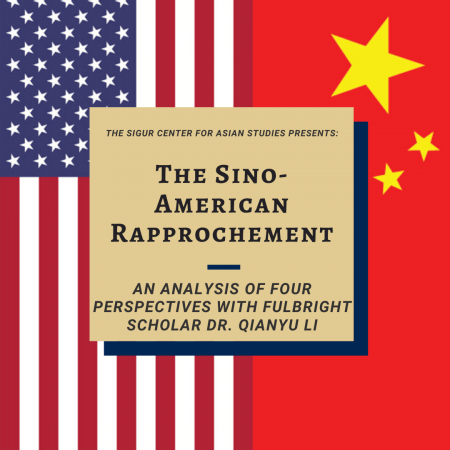
Friday, February 28, 2020</strong style>
11:00 AM – 12:30 AM
Chung-win Shih Conference Room, Suite 503W
Elliott School of International Affairs
1957 E Street NW, Washington, DC 20052

The Sigur Center for Asian Studies cordially invites you to a discussion with Fulbright scholar and Sigur Center Visiting Scholar, Dr. Qianyu Li, on his research about US-China relations.
Dr. Qianyu Li will deliver a lecture that comprehensively introduces the decisive factors that shape the process of Sino-American rapprochement in the 1970s. Since 1969, China and the US have reduced tensions through joint efforts, such as President Nixon’s historic visit to China and the issuance of the Shanghai Joint Communiqué. The Sino-American rapprochement also substantially changed the whole situation of China’s foreign affairs and the balance among great powers. Most developed countries and international organizations established formal, diplomatic ties with the People’s Republic of China; ideological influence had a decreasing role in the decision-making of China’s foreign policies. The rapprochement happened in a special historical era of the Cultural Revolution. It seems that the possibilities of all these factors were the least possible in that period of time.
The Sino-American relations stagnated after 1972 until diplomatic relations were formally established between the two countries in 1979. The rapprochement and stagnation are cause for Dr. Li’s research. In his lecture, he will analyze China’s diversified motivations for the dramatic changes and its causes for the stagnation from 4 perspectives:
1. China’s national security situation and strategic adjustment
2. Domestic politics
3. Two-level game theory
4. Mao’s personalities
This event is free and open to the public. Lunch will be provided.
Dr. Qianyu Li is an Associate Professor working in the Department of Diplomacy at China Foreign Affairs University (CFAU), and an accomplished scholar on Cold War history. He received his Bachelor’s and Master’s in Law from CFAU, and obtained his Ph.D. from Peking University. Dr. Li has published one book, “From Bandung to Algiers: China and Six Afro-Asian International Conferences (1955-1965),” and twenty articles in academic journals, and contributed chapters to several books talking about China’s diplomacy.

